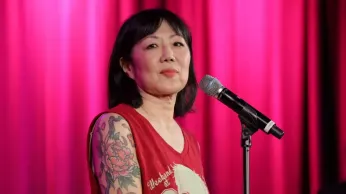
2 hours ago
Margaret Cho Calls Anti-Trans GOP Rep. Nancy Mace a "Stupid B**tch"
READ TIME: 3 MIN.
Margaret Cho, the acclaimed bisexual comedian and longtime LGBTQ+ rights advocate, has sparked a firestorm after delivering a pointed critique of U.S. Representative Nancy Mace, a Republican lawmaker known for her anti-transgender views. In a comment widely circulated across social media, Cho referred to Mace as “a stupid b**tch,” drawing both condemnation and support from various quarters in the ongoing national debate over transgender rights .
Representative Nancy Mace, who serves South Carolina’s 1st congressional district, has developed a reputation among LGBTQ+ advocates for supporting legislation and rhetoric that many view as hostile to transgender people. Mace has publicly backed measures such as transgender bathroom bans and has been described by multiple outlets as a leading voice in the Republican Party’s efforts to restrict transgender rights .
Her recent comments and legislative actions have been met with protests from LGBTQ+ activists. In December 2024, for example, more than a dozen activists were arrested at the U.S. Capitol during a sit-in against a Republican-backed transgender bathroom ban, with Mace’s name prominently mentioned in protest materials . Mace has also made headlines for using derogatory language toward LGBTQ+ individuals in public forums, which has intensified scrutiny of her rhetoric and policy positions .
Margaret Cho is renowned for her unflinching comedy that tackles issues of identity, discrimination, and political hypocrisy. Her work frequently draws connections between comedy and activism, using humor as a vehicle to challenge bigotry and empower marginalized communities. In a June 2024 interview, Cho described jokes as “a major tool for personal and political survival,” underscoring her commitment to using art in the struggle for equality .
Cho’s latest comments about Rep. Mace come amid a national climate of heightened polarization over LGBTQ+ rights. As legislative attacks on transgender people have increased across the United States, many LGBTQ+ advocates and allies have adopted more direct, sometimes confrontational, language to push back against what they see as existential threats to fundamental rights.
The controversy has also reignited debate about the role of language in political discourse and activism. Some advocates have pointed out that the focus on Cho’s words risks diverting attention from the substantive harms caused by anti-transgender legislation. Others maintain that public figures have a responsibility to model respectful engagement, even in the face of discrimination.
The incident between Cho and Mace is not occurring in a vacuum. Across the United States, dozens of states have introduced or passed laws targeting the rights of transgender people, including restrictions on healthcare, sports participation, and access to public facilities. These measures have been widely condemned by civil rights organizations, including the Human Rights Campaign and the American Civil Liberties Union, as dangerous and discriminatory .
For many LGBTQ+ individuals and their allies, Cho’s words—though controversial—are seen as part of a broader struggle to push back against policies that threaten the safety and dignity of transgender people. The debate also highlights the emotional toll that continued legislative attacks have on affected communities, as well as the urgent need for solidarity and advocacy.
As the 2026 election cycle approaches, issues of LGBTQ+ rights and the language used to discuss them are likely to remain at the forefront of national politics. Advocates continue to emphasize the importance of centering the voices and experiences of transgender people in all conversations about policy and representation.
Margaret Cho, for her part, has not issued an apology or retraction. Instead, she has reiterated the necessity of standing “tall for queer youth in the face of hatred,” emphasizing that strong language may be needed to confront entrenched bigotry .
The incident serves as a reminder of the intensity of the current moment for LGBTQ+ Americans—a moment marked by both significant challenges and unwavering resilience.






